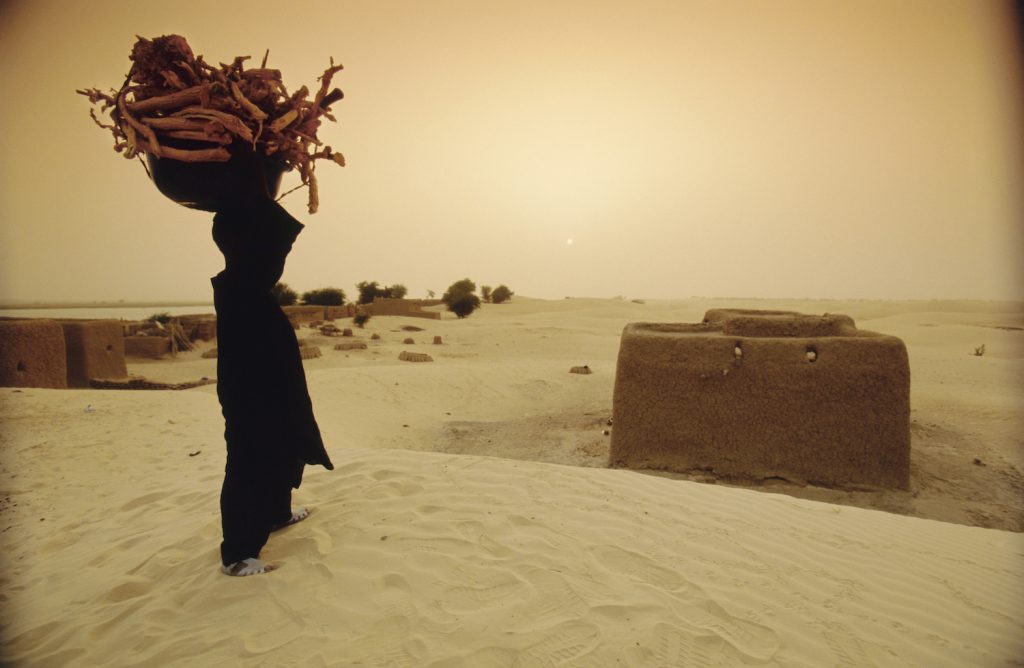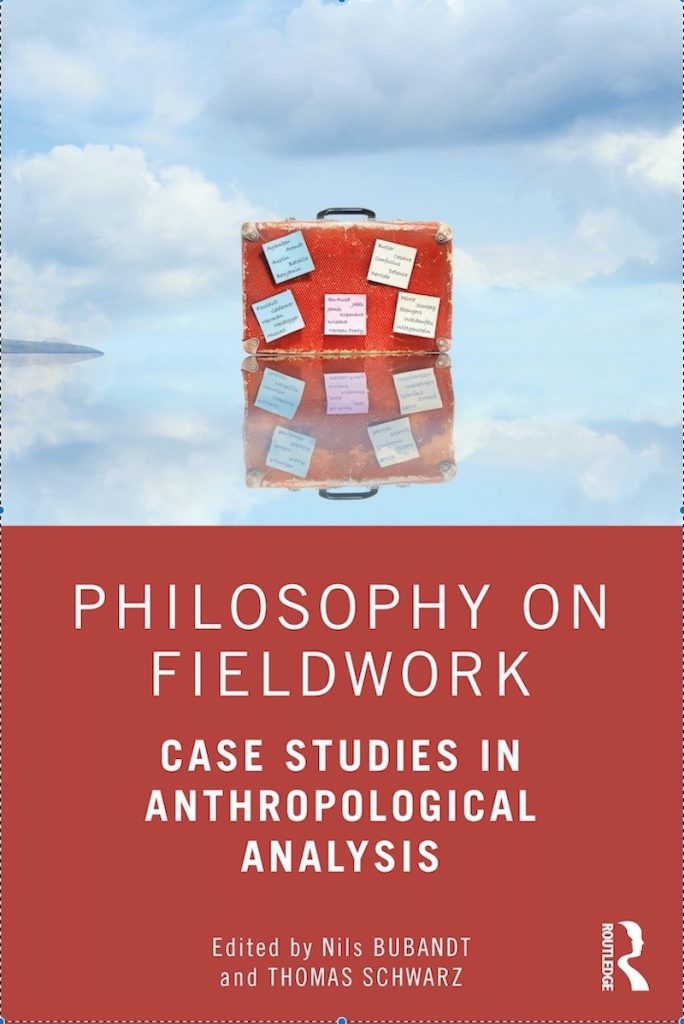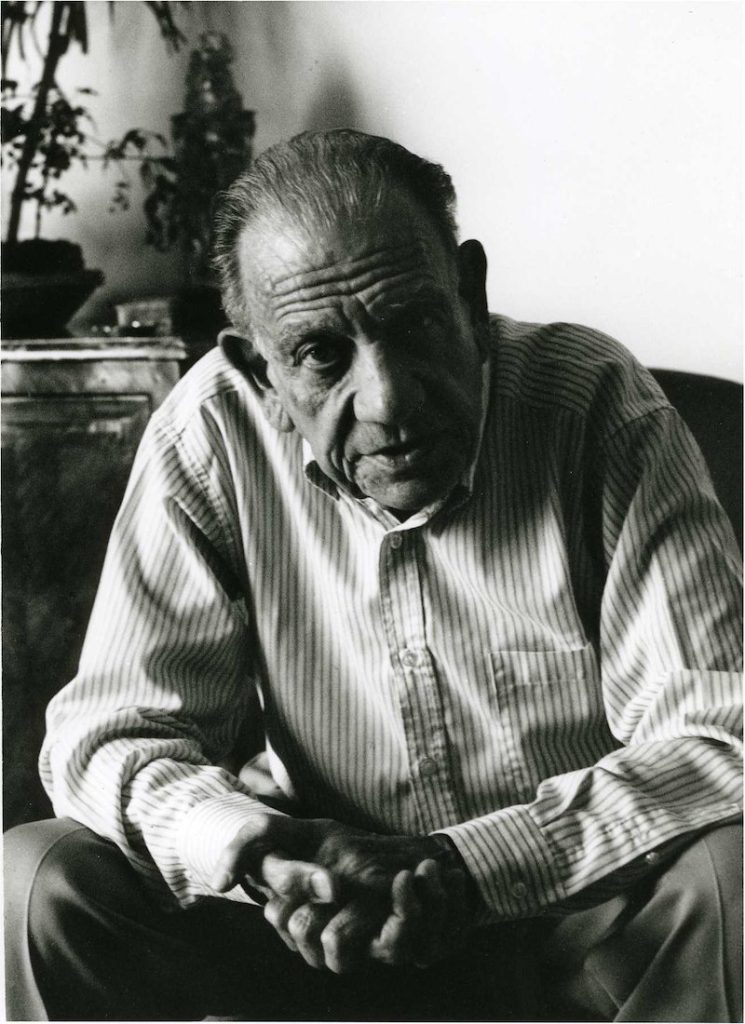Wisdom From the Winding Path

Excerpted from Paul Stoller’s essay “Jabès Amongst Songhay Sorcerers” in Philosophy on Fieldwork: Case Studies in Anthropological Analysis, edited by Nils Bubandt and Thomas Schwarz Wentzer. © 2022 Routledge. Used with permission of the publisher. All rights reserved.
In these hard times of pandemic, ongoing wars and nuclear threats, and other stressors, poetic dreams can bring comfort and may even guide us in how to live well. Edmond Jabès, a 20th-century French writer and poet, who was originally from Egypt, has inspired such dreams that interweave my past fieldwork with Songhay sorcerers in Niger over a 30-year span. Jabes probed the fullness and emptiness of experience, the pleasure and pain of human existence, and the sweetness and sorrow of life and inevitable death.
Through his evocative poetry of empty spaces—lyrical poems about the desert and of the trials of living-in-the-world, Jabes’ work compels the reader to dream about what life is and what life might become. For Jabès, the wounds of living seep into the chasm between birth and death, a chasm not only filled with pain, suffering, and turbulence, but also much inspiration and illumination.
Below is a lightly revised excerpt from “Jabès Amongst Songhay Sorcerers,” one of 32 illuminating essays in the new anthology Philosophy on Fieldwork. I describe part of a recurrent dream in which Jabès and I wander across a Nigerien dreamscape to Amadu Zima, a zima (ritual priest) who leads ceremonies, works with plants, and offers his community other types of services.
SONGHAY SORCERERS AND THE WISDOM OF EDMOND JABÈS
Songhay people have long lived in the steppes and deserts in Niger and Mali. They cultivate millet and sorghum, and mostly live in small rural villages. During the reign of sorcerer-king Sonni Ali Ber (1464–1491), the Songhay controlled much of West Africa. The great practitioners of Songhay sorcery, the sohanci, are the descendants, through the patriline, of Sonni Ali Ber. To this day, Songhay sorcerers position themselves between the village and the bush. They live in dream spaces that connect the social and spirit worlds. As such, they live at the edge of social life, where they continuously confront the limits of consciousness.
Like Songhay sorcerers, Jabès lived between things—between Egypt and France, between silence and the word, between life and death. On his soulful dream journey, Jabès, like the Songhay sorcerers who have been my teachers, extracted joy from sorrow, love from despair, and concrete clarity from fragmented confusion.
A DREAM JOURNEY IN NIGER
I am walking with Jabès across a hard clay plain strewn with thousands of black volcanic rocks. We stride slowly, our hands behind our backs. We walk in silence, listening to the sounds that reverberate in the bone-dry air of the Sahelian steppe—the whir of the Harmattan, the desert wind, the crunch of sandal on sand, the occasional chirp of a bird or the grunt of a camel.
Before us, we silently gaze upon Wanzerbe—two dusty wind-swept mudbrick neighborhoods perched on dunes and separated by a sandy valley. Descended from the great Songhay king Sonni Ali Ber, Wanzerbe sorcerers have long lived in the mudbrick compounds that give a semblance of form in the shimming light of this remote space.
Along the path to town, Jabès bends down and picks up several stones. He examines each stone with blue-eyed intensity. “Stones are special,” he says. “This is a place of stones, of emptiness, of eternal nothingness.”
Jabès carries three stones into the village. People greet us with warm smiles. A crowd of giggling children follows us.
Jabès is beaming. “I like this place,” he says.
“They say it is dangerous,” I say.
“Yes,” Jabès says, “there is so much death in the air. I can smell it, but the ever-presence of death engenders life, does it not?”
After days of walking from Wanzerbe, we are in Mehanna. Toward sunset, a time in Songhay villages when, after an arduous day of farming, fishing, weaving, smithing, or selling, people relax, drink tea, and exchange stories, we walk to Amadu Zima’s run-down compound.
We encounter a soft man with a hard face who welcomes us into his modest mudbrick hut. Amadu Zima, whose old face is heavy with the dust of long travel and sadness of loss, looks at Jabès. “Man with blue eyes,” he says, “I told Paul my story years ago, and I’d like him to tell it to you.”
“I’d like to hear it,” Jabès says.
THE WISDOM PATH AND CUSTODIANS OF KNOWLEDGE
I begin: Songhay elders like to say that the easy path, a straight line from one point to the next, is often free of inconvenience, pain, and suffering. But such a path rarely leads to enlightenment. Inspiration, they like to say, comes from your struggles along the long, tall, and winding path. Amadu Zima is a man who taught me much about the obligations of possessing knowledge. He is a man who lives quietly in Mehanna, a person who spent his formative years seeking sorcerous power. In his life, he has followed a long and tall path that brought him much joy and much sorrow.
He was born an orphan on the Niger River island of Sinder. His father, a Wogo man, a Songhay-speaking ethnic group that lives on Niger River islands, died before he was born. His mother died when she gave birth to him. A noble family on the island adopted him as a captive, meaning they clothed, housed, and fed him in exchange for his services. Although his “family” looked after him, he did not like his “captive” stigma, a status not unlike that of an enslaved person.
Amadu Zima walked his path with dignity and determination.
As a young man, Amadu Zima began to travel. He had no plan other than to walk west and meet people. He left Sinder, made his way across the Niger River and walked west. He met an old man who no longer had the capacity to farm his large holdings.
“My sons have left me,” he told Amadu Zima,” and I have no one left to help me.”
Amadu Zima labored for this old man for seven years. They became like father and son. One day the old man approached Amadu Zima.
“Would you marry my daughter and remain in Aribinda?”
“I’m not ready to marry, Baba,” he replied.
“Then what would you like?”
“The only thing I want, Baba, is sorcery.”
The old sorcerer told Amadu Zima to take his machete and walk to a tall termite hill that rose in the very center of his millet field. He told him to cut it down. When he did so, Amadu Zima saw a wide deep hole and heard movement from below. Slowly and inexorably, a python emerged from the hole. Using the machete, Amadu Zima killed the python and, for good luck, cut it into seven pieces. He returned to the old sorcerer’s house and showed the old man the fruits of his labor.
The old man smiled at his fictive son. He told him to cook one piece of snake for seven days. He said that with python in his belly the magic words he was about to teach him would carry power. He taught him everything he knew and told him to continue his journey.
Amadu Zima walked south to the land of the Bariba in what is today Northern Benin. There, he found an old man who needed a strong hand to help him to farm his field. For seven years, he worked for the old man, who housed and fed him. One day Amadu Zima announced that he wanted to return home to Niger.
“What can I give you, my son?”
“Magic,” Amadu Zia replied.
The old Bariba man, a master herbalist, taught Amadu Zima everything he knew about plants, about healing people from village illnesses and bush illnesses. A man well-versed in the arts of healing and magic, Amadu Zima was still very much alone in the world. He had no wife, no family.
He left the village and walked to Mehanna, where he became the village zima, the priest of the local spirit possession troupe. Every year, he performed rites that protected local crops from pestilence. Every year, he organized a yenaandi, the spirit possession ceremony that ensured ample rains during the planting season. He married his first wife, and soon thereafter welcomed his daughter into the world. For the first time in his life, Amadu Zima had a family, a real home. But he yearned for a son to whom he might pass on his considerable knowledge. Alas, his wife never again became pregnant. As the years passed by Amadu Zima continued to serve the people of Mehanna. People liked and respected him.
His wife sickened and died. Grief sapped his energy. Amadu Zima adjusted to a solitary life in his compound. Some people came to visit to seek cures for their illnesses. Some people wanted success in their endeavors. In time, he had earned enough money to pay the bride price for a new wife. He married again, but his new wife did not become pregnant. As time marched on, fewer people came to see him, and his wife and daughter spent many of their days with friends in the village.
Amadu Zima taught me what he knew about the spirits, about plants, and about farming magic. He also told me about horso magic. The horso, he explained, descended from those who were enslaved and from captives. Because the nobles deemed them expendable, they learned how to make themselves invisible. In time, they developed magic that made Songhay villages invisible to marauding Tuareg brigands.
This magic also protected Songhay villages from the conquering French expeditionary forces that pillaged their way through Niger and Mali in the late 19th and early 20th century.
Amadu Zima pointed to a tin of Nescafé coffee.
“That tin,” he said, “is for you. Open it.”
Inside the tin I discovered a brown mixture—a resin that would, according to Amadu Zima, enable me to walk strongly on my path.
“You prepare hot coals in a brazier and sprinkle them with the powder and breathe in the smoke. Take it with you to America,” he said. “You are the son I never had.”
My retelling of Amadu Zima’s story grabbed Edmond Jabès’ soulful attention.
“What became of Amadu Zima?” Jabès asks at a later point in the dream.
“It’s been a very long time since Amadu Zima re-joined his ancestors, and yet his memory is woven into my being.”
“And the Nescafé tin?”
“It is positioned prominently on the altar I keep in my study. From time to time, I open the lid and pinch the resins that he long ago gave to me. When I open it, I always remember the soft gaze of his cloudy eyes and the smooth tone of his voice, a tone that reflected both kindness of heart and sadness of spirit. He led a life filled with the thrill of learning and the despair of disappointment.”
“What is his legacy?” Jabès asks.
“Like you, Edmond Jabès, he confronted solitude and despair with patient grace. Like you, his path was long and twisted. Even in the face of uncertainty and difficulty, he, like you, walked his path with dignity and determination. When he reached a fork on the path of his life, he chose a new direction and accepted the consequences of his decisions. Weak and nearly blind toward the end of his life, he welcomed an anthropologist into his life and bestowed upon him the gift and responsibility of knowledge.”
“What did you learn from Amadu Zima?” Jabès asks.
“He taught me that we are not owners of knowledge. He taught me that in Songhay, sorcerers are custodians of knowledge. In his case, he spent years patiently acquiring knowledge, looked after it during his short time in the world, and then passed it on to the next generation. No matter the difficulties we face, we can invent ways to make sure that our knowledge is conveyed to future generations. That was Amadu Zima’s path and his gift to the world.”
“My path and the path of Amadu Zima are intertwined,” Jabès says. “We are both wounded souls, seeking the truth of being. I am so happy to hear his story. It makes me feel less alone in the world.”
This excerpt has been lightly edited for style, length, and clarity.




























